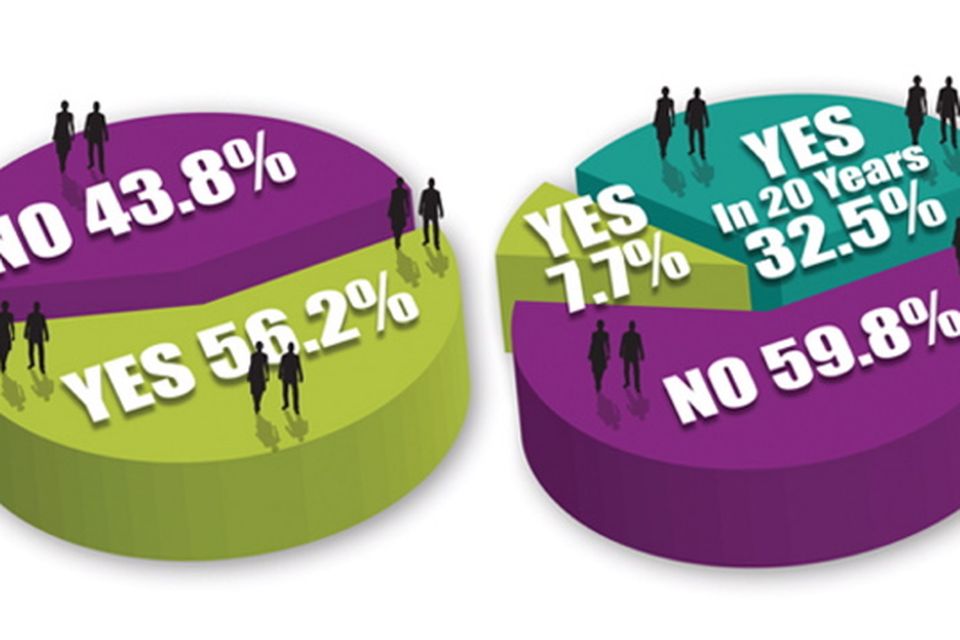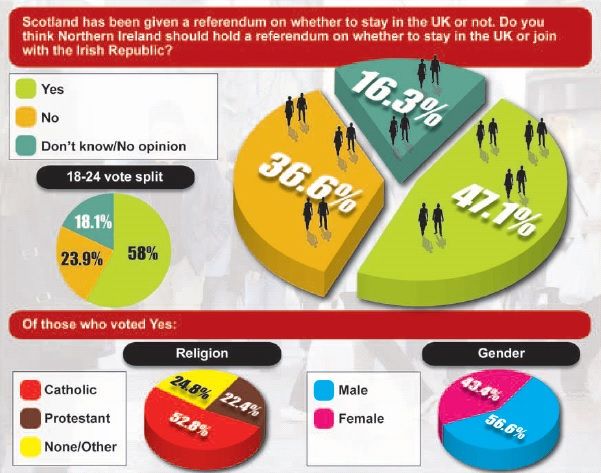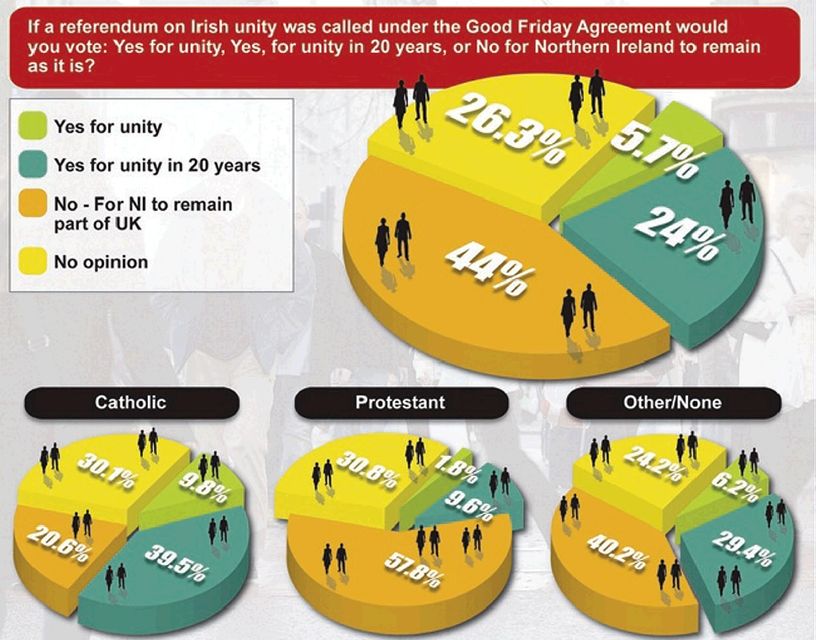Northern Ireland says 'yes' to a border poll... but a firm 'no' to united Ireland
Exclusive survey finds strong backing for a vote on our constitutional future after Scottish referendum
The people of Northern Ireland want a border poll referendum (left) - but there is still no significant appetite for a united Ireland (right). *Total excludes no opinion/no vote
An appetite is growing for the people of Northern Ireland to be given a referendum on the border, a major Belfast Telegraph poll has found.
But there is no significant momentum towards voting for a united Ireland.
The Belfast Telegraph today begins publishing the results of our third annual opinion poll which delves into a wide range of issues facing the people of Northern Ireland today.
In the first of a series of results to be published throughout the week, the LucidTalk partnered poll looks at opinions on a border poll, Irish unity and feelings of national identity.
The results come just over a week after the people of Scotland went to the polls to reject independence in a referendum.
The answers to our poll show a fascinating insight into Northern Ireland feelings on national identity on the back of the Scottish referendum – and how we would vote if given a border poll.
Significantly, the survey found that most people who expressed an opinion want a border poll.
Yet Irish unity appears as far off as ever because an even larger majority say they would vote against removing the border, given the opportunity.
The pro-Union majority includes one in five Catholics (20.7%). Sinn Fein is currently calling for a border poll to be held. They are backed in this by 81% of Catholics and 24% of Protestants, giving a majority of 59% once don't knows (DKs) are excluded.
This showed a strong appetite to discuss the constitutional issue but an even stronger inclination to remain in the UK.
On the question of national identity we emerged as a society of minorities with no group able to say it represents the majority view. The largest section of the population gave their identity as British (41.8%), followed by Irish (25.3%) and Northern Irish (13.1%). 18.1% had no opinion and a tiny 1.7% gave some other nationality.
Our LucidTalk opinion poll of 1,089 voting age people was carried out at the time of the Scottish independence referendum which was held on September 18. About half were interviewed before the referendum result was known.
People may have felt empowered by the debate in Scotland and wanted something similar here. Only 16% of people declined to give an opinion on whether there should be a referendum.
Yesterday, the First and Deputy First Minister announced a meeting with counterparts in Wales and Scotland to discuss the way in which the nations of the UK are governed. They will discuss how the Scottish referendum will impact on constitutional and policy reform across the UK.
"The Scottish referendum has provided a unique opportunity to examine the process of constitutional change and the impact on devolved institutions," a joint Peter Robinson and Martin McGuinness statement said.
"There is a need for a new conversation with all the devolved institutions around the table. Through collaboration we will be better placed to work in a manner which benefits all our people."
Under the Good Friday Agreement the Secretary of State – currently Theresa Villiers – can call a unity poll if she thinks there is a likelihood that people will vote to change the status quo.
If the vote goes for Irish unity then the Government must facilitate it in cooperation with the Irish government.
Before unity actually takes place it must be backed by concurrent referenda held on the same day in both the Republic and Northern Ireland.
In practice there would probably be a period of negotiation so that a package outlining the political and economic arrangements could be put to the electorate.
So far all opinion polls have shown a comfortable majority against unity. As in our previous polls we gave three choices so as to test both hard and soft support for unity.
The first option, for unity as soon as possible, got negligible support of 5.7% or 7.7% if the don't knows are excluded from the calculation.
By comparison Sinn Fein, which is campaigning for a unity referendum, got 25% of the first preference vote and topped the poll in this year's European election. It is clear that most of its supporters do not support unity as an immediate priority. Unity in 20 years, a more aspirational choice, got 32.5%.
Further reading:
Read more
'Bring it on'... 'Let's test opinion'... 'Let's have a debate'... what the survey respondents said
“Bring it on — let's show SF that the vast number of NI people want to be British.”
From a referendum-supporting Protestant
“I'm for the UK at the moment, but let's have a debate and referendum about all relationships within these islands.”
From a referendum-supporting Catholic
“I want a referendum — I was in Scotland for the past two weeks and they're great craic.”
A referendum-supporting respondent, 18-24 age group
“We have enough problems here without a referendum.”
An anti-referendum respondent, in the over 65 category
“Let's test opinion — we want a united Ireland and there's more support for it than people think.”
A referendum-supporting Catholic
“It should be a 32 county vote, not just Northern Ireland.”
A referendum-supporting Catholic.
“Both governments need to bring in a referendum on the whole constitutional position in Northern Ireland — but it
must be on an all-Ireland basis.”
A referendum-supporting Catholic.
ON HOW THE VOTE WOULD GO IN A REFERENDUM...
“I want to stay in UK for the moment but may support a united Ireland in future if conditions are right.”
Catholic voter
“We're British and are staying British”.
Protestant respondent
“I would vote no at the moment but may change my mind if I knew what type of united Ireland it would be.”
Protestant respondent
‘I may support a united |Ireland, but we need to know how that would work.”
Catholic voter.
“You ask the Scots in the whole of Scotland then why not ask the Irish in the whole of Ireland not just the six counties?
Catholic respondent who would vote in favour of a united Ireland in 20 years.
“The Brits should never have been here — they should leave now.”
Pro-united Ireland Catholic



